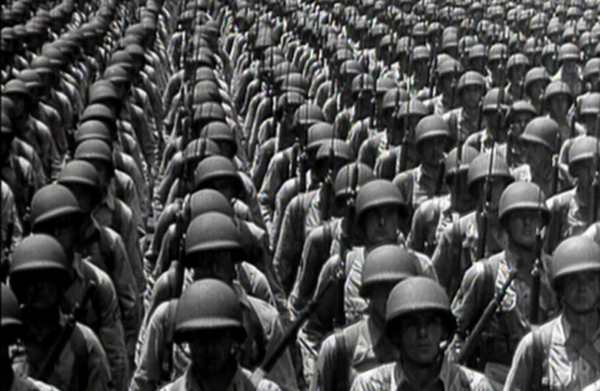Movie review by Greg Carlson
Eugene Jarecki’s sobering documentary will remind many viewers of Michael Moore’s “Fahrenheit 9/11,” but “Why We Fight” trumps Moore’s film on several counts, not the least of which is a steady journalistic style devoid of over-the-top stunt humor. Certainly Jarecki shares a great deal of Moore’s convictions regarding the George W. Bush administration, and “Why We Fight” includes the “War on Terror” among its concerns. “Why We Fight,” however, succeeds by focusing its primary attention on the central thesis that America has become – and will remain – a nation dependent on the business of war.
Adorning the film’s poster and serving as its thematic lodestar, the image of Dwight Eisenhower delivering his farewell address as president in 1961 sets up the film’s haunting refrain. In that speech, as many high school students (ought to) know, Eisenhower introduced the ominous term “military-industrial complex,” guarding future leaders against unchecked armament and weapon fortification. That Jarecki manages to make Ike out to be a sage prophet for peace is certainly one of the movie’s cleverest accomplishments. Once the numbers that describe current defense contracting are rolled out, the viewer is left with the queasy feeling that Eisenhower’s warning was never heeded. Instead, it seems to have been steamrolled.
Jarecki intercuts plenty of tasty archival footage with loads of talking heads. Some argue for the right, and many for the left. A few, including Senator John McCain, who practically jumps out of the interview chair when he’s told Dick Cheney is on the phone, aren’t terribly convincing in either capacity. Along with McCain, Jarecki speaks with Joseph Cirincione, Chalmers Johnson, Richard Perle, William Kristol, Dan Rather, and Gore Vidal, among others. One of the most compelling figures to appear in “Why We Fight,” however, is retired NYC police officer Wilton Sekzer, whose son was killed in the 9/11 attacks.
Sekzer’s earnest, heartfelt outpourings of frustration and rage manifest in his unflagging support of the invasion of Iraq, which he is convinced represents “payback” for 9/11. As soon as Bush began to downplay the link, Sekzer’s response takes a flabbergasted turn. It is too bad Jarecki didn’t use more civilians as case studies in the film, as Sekzer’s screen time is riveting. The director also elicits an emotional response from retired air force colonel Karen Kwiatkowski, but most of the interview subjects stick with their well-practiced soundbites.
Historians often contend – with the benefit of hindsight – that governments lie and cover up in times of war and peace. Even so, the movie’s inclusion of footage of Donald Rumsfeld meeting with Saddam Hussein retraces America’s hapless relationship with Iraq. The current Bush administration – as has been argued in mainstream publications like “Newsweek” and “Time” – is one of the most secretive presidencies in United States history. One of the questions raised, but not answered, by Jarecki’s documentary moves past the movie’s title to inquire why more common folks don’t demand greater accountability from our leadership when the answers that we are given don’t entirely add up.
